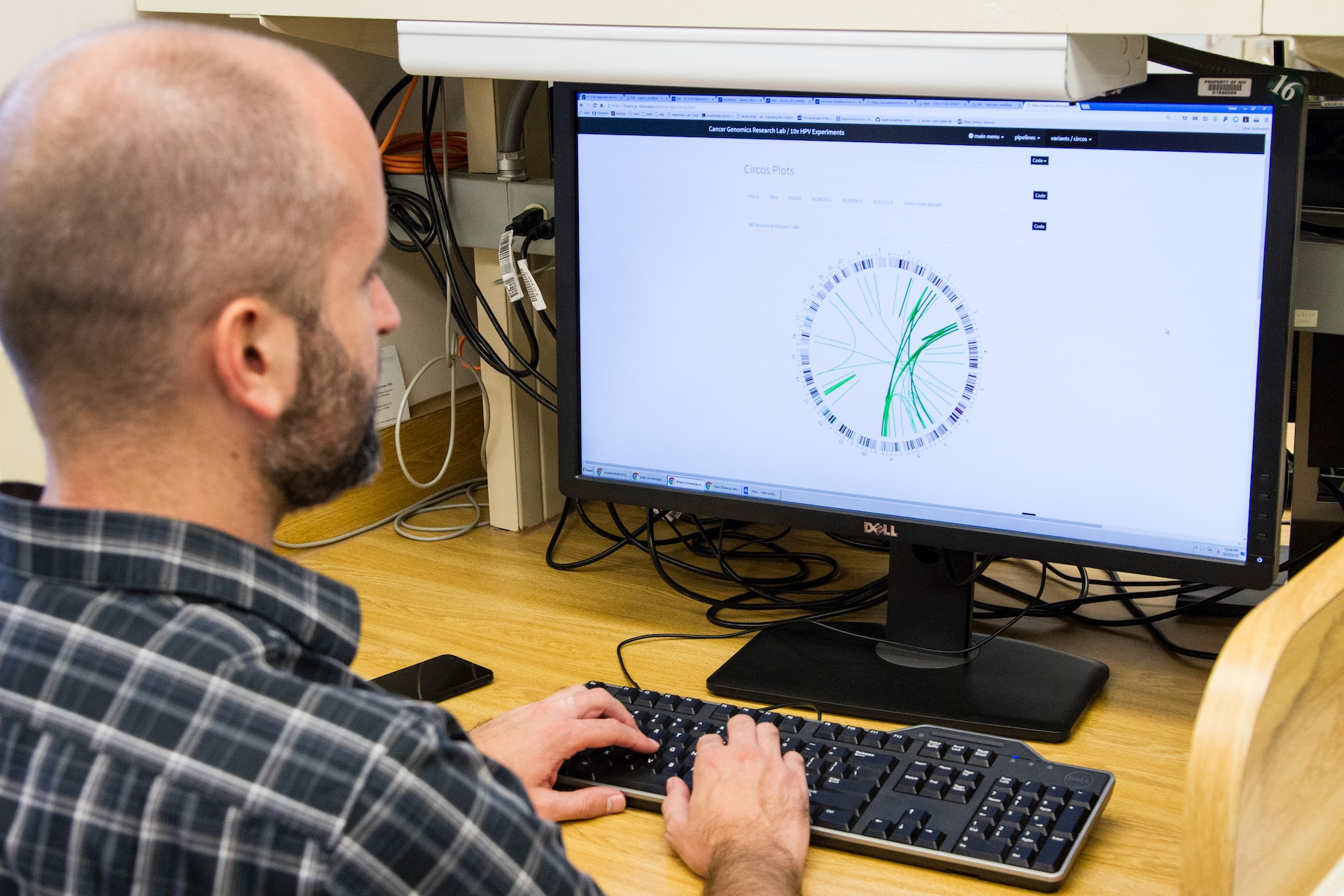
Insights
Why Are Bioinformatics Jobs Crucial Within Biometrics?
15 Dec, 20238 minutesBioinformatics jobs are rapidly growing. According to a report published by Grand View Resea...

Bioinformatics jobs are rapidly growing. According to a report published by Grand View Research, the global market size was valued at around $10bn in 2020 and is anticipated to expand at a rate of 13.7% each year in the run to 2030.
The role of Bioinformatic analysis has become increasingly pivotal within the clinical trial and pharmaceutical research environment. The intersection of data and biology has opened up a world of opportunities for improved research, advanced drug development, and enhanced patient outcomes.
In this guide, we’ll answer the question “What is Bioinformatics?”, providing you with a clear example of the importance of Bioinformatic analysis in the clinical trial industry. After this, we’ll look closely at Bioinformatics recruitment. We’ll show you how it can help you to connect with candidates at all levels of seniority through an understanding of the industry, in-depth knowledge of the responsibilities and duties found throughout Bioinformatics jobs, and a clear illustration of the talent market for professionals in the field.
What is Bioinformatics?
So, what is Bioinformatics? In a multidisciplinary field, Bioinformatics professionals merge the worlds of biology, computer science, and statistics, applying computational techniques and tools to manage, analyse, and interpret biological and clinical trial data. From playing a major role in our everyday lives to having a significant impact on the success of clinical research, Bioinformatics jobs are vital to ensuring innovative developments make it to market.
This data encompasses a broad range of information, bringing together genomic sequences, drug and device data, and insights in proteomics and metabolomics to enhance the collection, security, analysis, and reporting of clinical trial results.
The primary goal of Bioinformatics jobs is to extract meaningful insights from the large volumes of data generated through the clinical research process, developing the algorithms, software, and databases that will help other Bioinformaticians and colleagues throughout the clinical trial life cycle to make data-driven decisions.
In short, Bioinformatics continues to play a crucial role in advancing our understanding of diseases, drug development, and the increasing personalisation of medical therapies. With the growth of personalised medicine doubling each year between 2016 and 2020, there’s likely to be no shortage of Bioinformatics jobs to fill over the coming years.
The Importance of Bioinformatic Analysis in the Clinical Trial Industry
In the clinical trial industry, Bioinformatic analysis is the lynchpin around which the diverse threads of data wind. Quickly proving its indispensability, the professionals in Bioinformatics jobs carry out a range of unique business functions, including:
- Data integration. Clinical trials generate extensive data, from patient demographics to biomarker information. Professionals in Bioinformatics jobs enable the integration of this data, providing a holistic view of the trial’s progress and success.
- Data quality control. Ensuring data accuracy is a paramount concern in the clinical trial industry. The tools Bioinformaticians leverage in their day-to-day responsibilities are designed to identify and rectify errors and inconsistencies, reducing the risk of skewed results or trial participants' harm.
- Predictive modelling. When it comes to answering the question “What is Bioinformatics?” we can’t ignore the importance of the predictive modelling these specialists carry out. Bioinformatics facilitates the creation of these models, helping researchers and healthcare providers anticipate potential issues or highlight trends that arise during the trial process, leading to better decision-making.
- Patient stratification. As we continue to evolve therapies in this era of precision medicine, Bioinformatics jobs are crucial to completing the task of identifying patient subgroups that may respond differently to treatment. This allows for developing tailored, bespoke medicines and devices, improving overall trial outcomes and contributing to public health.
- Safety and adverse event monitoring. The timely detection of adverse events and monitoring of patient safety are vital in any clinical trial. Effective Bioinformatics recruitment can connect you with candidates who can flag potential safety concerns, enabling prompt action which ensures long-term organisational success.
Bioinformatics is an essential field of study and work, with the methods of professionals playing a central role in interpreting molecular data and providing data-driven recommendations for drug development, diagnosis, and therapy. It allows us to revolutionise precision medicine, providing a range of insights into patient and trial participant data and enabling the rapid development of personalised treatments that drive better patient outcomes.
If you’re interested in learning more about the field, see our recent guide to the Five Future Trends in Biometrics Shaping the Health and Life Sciences, in which we cover the technologies and advances that will empower the current generation of professionals in Clinical Data Management, Biostatistics, and Bioinformatics jobs.

How Bioinformatics Recruitment Helps Connect You with Top Talent
So, now that we’ve answered the question “What is Bioinformatics?”, we can look closely at what Bioinformatics recruitment agencies are able to do to connect you with only the best talent in this burgeoning, data-driven field.
Bioinformatics isn’t just about technology and data—it’s about the people who understand the science and can harness its power to make a real impact. The right candidate can make or break your clinical research and trial initiatives, which is why efficient and productive Bioinformatics recruitment is a business-critical consideration for any business carrying out work within this environment.
Industry-experienced recruiters bring valuable insights to the process. Their familiarity with the specific requirements of Bioinformatics roles allows them to identify and select candidates with the necessary skill set more effectively. This expertise enhances the chances of securing the right talent, contributing to the overall success of your projects.
1. Life Science Recruitment Expertise
Recruiting for Bioinformatics jobs in the life science industry is challenging, requiring a deep understanding of specific skill sets and qualifications. Scientifically educated recruitment professionals, familiar with industry demands, ensure candidates possess technical skills and understand regulatory and ethical considerations. Collaborating with your organisation, they grasp your unique culture and employee value proposition, positioning you to attract and retain top talent for innovation.
Experienced recruiters in Bioinformatics jobs accurately assess candidates, maintaining high standards. Leveraging existing talent networks, they streamline the hiring process, reducing onboarding time. Networks include both active and passive job-seekers, providing executive candidates tailored to your needs, whether entry-level or seasoned professionals.
Expert Bioinformatics recruitment firms acknowledge regulatory requirements, which are crucial for compliance in reporting and submission. Life science recruitment consultants facilitate the discovery of candidates well-versed in compliance importance.
2. Recognition of the Importance of Bioinformatic Analysis
Bioinformatics jobs have significantly impacted the clinical trial industry despite being a growing field. In short, the importance of Bioinformatic analysis can’t be overstated, and forward-thinking CEOs and hiring managers in the life science sector recognise this fact.
Bioinformatics isn’t just a trend; it’s a core element that enables organisations to stay competitive within an environment marked by significant innovation and dynamism. Bioinformaticians help organisations to process and interpret data faster, leading to more effective decision-making processes.
Streamlining the gathering and analysis of data in this way is perhaps the biggest benefit of Bioinformatics jobs. They drive cost efficiency within a clinical trial organisation, helping to expedite planning phases and identify promising drug candidates early, reducing the high levels of expense associated with research and development initiatives.
Ultimately, Bioinformatics plays a vital role in improving participant and patient outcomes. With a revolution in bespoke, personalised medicines currently underway and shepherded by experts in Bioinformatics jobs, clinical trials are continuously delivering effective treatments that reduce the overall disease burden on the healthcare industry, providers, patients, and their families.
3. Understanding the Talent Market for Bioinformatics Jobs
A successful Bioinformatics recruitment campaign requires several essential elements, one of which is an understanding of the dynamics of the talent market in this niche, complex field.
Bioinformatics professionals are in high demand, and the supply of qualified individuals is limited. Whilst Bioinformatics is a sector of strong growth, with around 56,000 new jobs a year, the shortage of candidates in the private, public, and academic sectors is only growing.
As a result, having a specialist life science talent partner by your side can help you to effectively navigate the industry and ensure that only candidates that are the best fit make their way into your Bioinformatics jobs.
Encompassing a broad spectrum of skills, from data analysis and study design to software development, the different roles that come under the broad heading of Bioinformatics will require different interview approaches. As a result, working with a specialist who has recruited for these roles in the past can help you reduce the time-to-hire and cost-per-hire for each candidate.
Likewise, with candidates for Bioinformatics jobs often coming from diverse academic backgrounds, it can be difficult to reconcile a vast range of qualifications and industry awards with a specific job description or person specification.
Instead, consider leveraging the services of a Bioinformatics recruitment agency to streamline this process. Given the complex nature of the field, they’ll be able to ascertain the fit of each candidate that applies for your vacant roles, understanding how their experience will be a valuable asset for your research team.
Similarly, reducing the length of time that your staff need to spend in the interview stages means that you can focus on your core tasks instead. Bioinformatics recruitment specialists will work in close partnership with your business to understand your internal culture, goals, and vision, ensuring that candidates are assessed for more than just technical expertise.
They’ll aim to connect you with talent that has a track record of effective communication, collaboration, and problem-solving in previous Bioinformatics jobs, especially crucial when working within the multidisciplinary teams that define the life sciences environment.
The fusion of biology and the data sciences in the field of Bioinformatics has had a transformative impact on the life sciences and clinical trial industries. However, staying ahead of other organisations and remaining competitive with your talent acquisition strategy can prove challenging, especially when you’re in a fast-growth phase and expected to deliver on your research and development initiatives.
This is where a Bioinformatics recruitment agency can step in, helping you to seize the opportunity that talented candidates present and determining your success in the years to come.
Bioinformatics Jobs and Life Science Recruitment: What We’ve Learned
The burgeoning and exciting field of Bioinformatics holds a pivotal role in the clinical trial and pharmaceutical research industry, making effective Bioinformatics recruitment a critical component of research and development success.
With the statistics all pointing towards rapid growth within the sector, its importance cannot be overstated. Exploring the question of “What is Bioinformatics?”, we see that Bioinformatic analysis bridges biology, computer science, and statistics, unlocking groundbreaking opportunities for advanced research, drug development, and better patient outcomes.
Bioinformatics jobs are the lynchpin of data management, quality control, predictive modelling, patient stratification, and safety monitoring in the clinical trial environment. As personalised and precision medicines continue to evolve, Bioinformatics only proves how essential it truly remains.
Efficient Bioinformatics recruitment is crucial for connecting with the top talent who can drive innovation within your organisation. Recognising the value of these professionals in empowering your data-driven decision-making is paramount, especially given how they’re able to expedite planning and drug candidate identification, ultimately improving participant and patient outcomes.
In a talent market with limited supply and diverse qualifications, partnering with a specialist life science recruitment agency can streamline hiring, ensuring the right fit for all placements. With the transformative impact of Bioinformatics proceeding apace, such partnerships will be the key to staying competitive and ensuring long-term success.
Expert Recruitment and Staffing Support for Bioinformatics Jobs
Explore the latest in Bioinformatics jobs with Warman O’Brien’s specialist consultants. We’ve dedicated nearly two decades to assisting enterprises in clinical trials and pharmaceutical development. Since our founding in 2005, we’ve expanded our global footprint, offering life science recruitment to markets across the UK, USA, and Asia Pacific regions.
We cater to a vast spectrum of positions and remain active contributors to the life science community, participating in gatherings and symposia such as PHUSE, PharmaSUG, and the ASCGT’s annual conventions.
Reach out to us today to have a discussion about your unique recruitment needs, regardless of their complexity.


